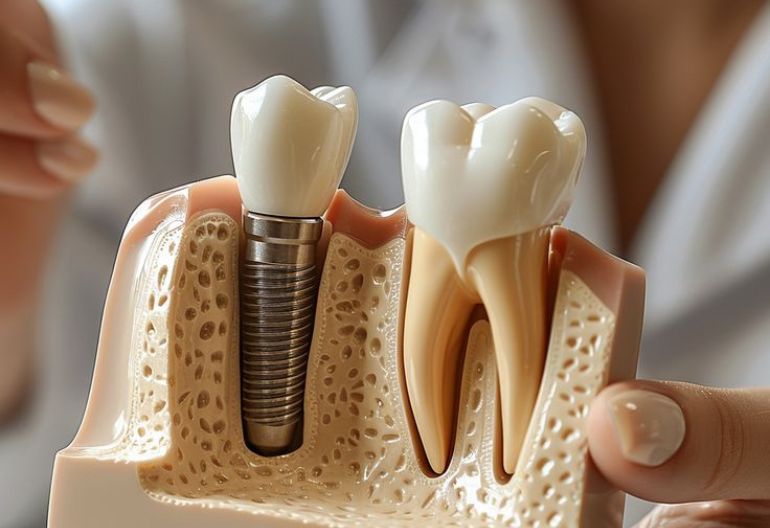

Dental Implants: Advantages, Disadvantages, and Who Should Consider Them
Missing a tooth can affect your smile, how you chew, and even your confidence. When a tooth is lost, a dental implant is considered the tooth replacement option that most closely resembles real teeth. Dental implants offer a long-lasting solution to replace missing teeth, but is it the right choice for you? In this blog, we’ll explain the advantages and disadvantages of dental implants and explain who should consider them in simple terms.
What Are Dental Implants?
A dental implant is a small titanium post that is surgically placed into your jawbone to act like a tooth root. Once healed, a crown (an artificial tooth) is attached to the implant, giving you a natural-looking and fully functional tooth. Dental implant treatment can be used to treat one or more missing teeth. It is considered the closest tooth replacement option to natural teeth. It helps restore functions such as chewing, speaking, and aesthetic appearance.
Advantages of Dental Implants
Natural Appearance and Feel: Dental implants have the same appearance and functionality as your real teeth. You won't notice any differences!
Long-Lasting Solution: With the right maintenance, dental implants can last a lifetime.
Enhances Speech and Chewing: You can speak and eat without concern because the implant is firmly affixed to the jawbone.
Prevents Bone Loss: Just like real teeth, dental implants can stimulate the underlying bone structure, which helps to preserve face shape and stop bone loss.
No Damage to Neighboring Teeth: When a tooth is missing, neighboring teeth can move into the empty space, resulting in bone loss and affecting the jaw structure.
Boosts Confidence: A big smile can make you look better and feel more confident.
Better Stability: They offer superior stability when it comes to biting and chewing. Patients can speak, eat, and smile confidently with the assurance that their implant will not move or fall out.
Disadvantages of Dental Implants
Surgery Required: Getting dental implants involves surgery, which can be uncomfortable for some people and requires healing time.
Longer Healing Time: After the implant is placed, it can take several months for it to fully heal and integrate with the bone.
Not Suitable for Everyone: Some people may not be good candidates for implants, such as those with insufficient bone or certain health conditions.
Who Should Consider Dental Implants?
An ideal candidate for dental implants is an individual who has excellent overall dental health and is missing a tooth or requires a tooth extraction. To be eligible for an implant, you must be in sufficiently good health to undergo dental surgery. Here are some situations in which dental implants can be chosen:
Have one or more missing teeth
Want a permanent, long-term solution
Have healthy gums and enough bone to sustain the implant
Are non-smokers (smoking can affect healing)
Are willing to invest time and money in a durable solution
Who Might Not Be a Good Candidate?
Individuals with significant jaw bone loss could require further treatments, such as bone grafts. Individuals with unmanaged medical issues, such as diabetes, may be more susceptible. Smokers may have trouble recovering from surgery.
Is a Dental Implant Right for You?
Dental implants are one of the best options for replacing missing teeth due to their durability and realistic look. However, they require a commitment regarding surgery, healing, and cost. Dental implants could be the excellent option for restoring your smile if you’re looking for a long-term solution and are in good overall health. Infinite Smiles provides effective dental implant treatment in Kolhapur. For any inquiries, visit us to determine if dental implants are right for you!

